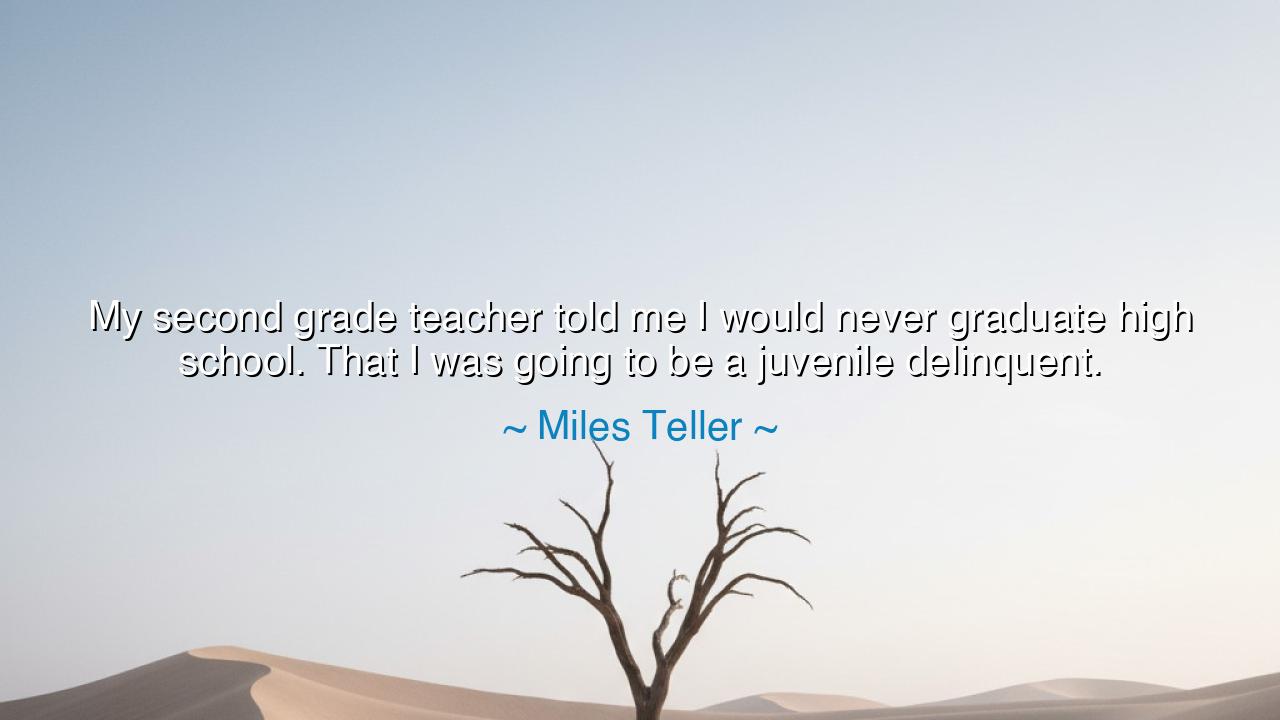
My second grade teacher told me I would never graduate high
My second grade teacher told me I would never graduate high school. That I was going to be a juvenile delinquent.






The words of Miles Teller—“My second grade teacher told me I would never graduate high school. That I was going to be a juvenile delinquent”—ring like a wound that became a weapon. They reveal how words, meant carelessly or cruelly, can echo in the soul of a child. A teacher, entrusted with the sacred task of lifting the young, instead cast a shadow upon him, declaring him destined for failure. Yet from this shadow rose a lesson for us all: that prophecy of doom need not be destiny, and that greatness is often forged in defiance of low expectations.
The origin of this truth lies in the power of authority. A teacher’s words carry weight far beyond the moment. To a child, the judgment of an elder can feel like fate itself, written upon the stone of their future. Teller’s teacher, in dismissing him, forgot the true role of a guide: not to condemn, but to kindle. Yet Teller himself, though branded with the mark of failure, refused to let those words define him. Instead, he carved out a life in which he proved the prophecy false. Thus, what was spoken as a curse became, through resilience, the fire of achievement.
History, too, tells of many who were underestimated, mocked, or dismissed in their youth, only to rise beyond imagination. Albert Einstein was considered slow, his teachers doubting his intellect. Thomas Edison was told by his own teachers that he was “addled” and unfit for school. Even Winston Churchill was ranked among the lowest in his class, seen as lazy and unfocused. Yet each of these figures transformed the sting of rejection into fuel, and their names endure not as failures, but as legends. Teller’s story stands in this lineage: the rejected child who grew into the accomplished man, the artist, the survivor of doubt.
The emotional power of this quote lies not in the cruelty of the teacher, but in the resilience of the student. For many, such words become chains, binding the spirit and draining the will. But the true hero learns to resist. To be told, “You will not succeed,” and to reply with life itself, “Watch me succeed,” is one of the highest acts of defiance. Teller’s story is a mirror to all who have been doubted, reminding them that the opinions of others are not the measure of their worth.
Yet there is also sorrow here, for how many children hear such words and do not rise above them? How many souls have been crushed by careless voices of authority, never realizing the greatness that lay within? It is for this reason that we must remember the sacred responsibility of teachers, parents, and mentors. Their words can either plant seeds of courage or sow weeds of despair. Teller’s teacher failed in this task, but the failure itself reveals the higher calling: to always build, never to destroy.
The lesson for us is clear: do not allow the judgments of others to define your destiny. Even the voices of authority can be wrong, blinded by prejudice or impatience. Within you lies a strength deeper than their doubts, a spark that no one can extinguish unless you surrender it. And likewise, when you speak to others—whether children, peers, or strangers—choose words that uplift. For you may be shaping destinies without knowing it.
What, then, shall we do? If we have been wounded by the words of others, let us turn those wounds into weapons of resilience. Let us rise higher precisely because we were told we could not. And if we are given the role of guiding others, let us speak life, not death; hope, not despair; encouragement, not condemnation. In this way, we break the cycle of harm and become true teachers of the human spirit.
Thus, Miles Teller’s words, though born of a bitter memory, shine now as a teaching for all generations: others may doubt you, others may condemn you, but only you can decide who you will become. And in choosing to rise, you become not only a survivor of doubt, but a beacon for all who are told they are destined to fail.






AAdministratorAdministrator
Welcome, honored guests. Please leave a comment, we will respond soon